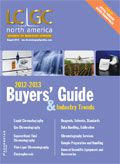Data Handling/Software
Today more than ever, efficient data handling software is an essential tool in analytical laboratories. Easy workflows, smart data storage and retrieval options, integration of data from multiple systems, and the ability to handle large volumes of data are all critical issues that users must consider when evaluating the choices.
Today more than ever, efficient data handling software is an essential tool in analytical laboratories. Easy workflows, smart data storage and retrieval options, integration of data from multiple systems, and the ability to handle large volumes of data are all critical issues that users must consider when evaluating the choices. Participants in this forum are Mark Harnois, Waters Corporation; Dan Holmes, Agilent Technologies; Jan Hruby, DataApex; and Fraser McLeod, Thermo Fisher Scientific.
How can scientists figure out which chromatography or mass spectrometry data handling solution is best for their needs?
Harnois: Scientists should ensure that a liquid chromatography–mass spectrometry (LC–MS) software solution provides the necessary functionality for their particular applications and provides meaningful answers to help advance their research. Beyond that, most LC–MS solutions provide sufficient acquisition and processing capabilities. The capabilities that scientists should really start considering are automated data management and server-based data processing (for processing during acquisition).
Holmes: Some very straightforward aspects to consider are whether or not the software is easy to use and supports better workflow processes. Can the scientist accomplish what needs to be done with the tools provided in the software? Each offering in the market has strengths.
Hruby: There is no available public, independent, and professional place for reviews or comparisons of data handling solutions, and demo versions are available from only a few producers. So I see only two ways for scientists to select the right solution: to spend time trying each solution in real operation, or to ask other users with similar demands for their opinions about the pros and cons of each solution. Of course, it is not possible to do that for all available solutions. So a preliminary selection based on “hard” requirements — available control modules, special calculations, standalone versus client server, computer environment, import–export capabilities, 21 CFR Part 11 compliance — has to be done first.
McLeod: Users must first understand their own needs clearly. Do they need a wide range of instrument control? Centralized data storage and handling? Compliance within regulatory frameworks? Customized reporting? Once those criteria are established, ease of use is paramount. The goal is operational simplicity, to make the software usable for people with little or no training.
What are the biggest concerns about data handling today?
Harnois: Modern LC–MS instruments have the potential to generate large quantities of data and scientists’ biggest concern is managing those data. They are responsible for transferring their data to a network file server, and today that operation is largely a manual one. However, a software solution based on a relational database would be a much better option for them, as it would allow them to have automated data management while at the same time making it much easier to process and report on the data.
Holmes: More and more, customers want answers as quickly as possible. They don’t want to spend time mining for data, particularly in routine applications such as looking for an impurity. Secondly, they are interested in combining data from multiple techniques. Typically data are in a single silo, such as in a mass spec instrument. Customers who want to gain more scientific insight would benefit from being able to access and report on this data in a unified fashion —for instance LC and MS on one platform.
Hruby: The staff tends to have less and less education in chromatography, so the solution must be simple, easy to use, safe, reliable, and traceable. Therefore, users need capabilities for proper, exact, and fast integration, and special complex (even customized) calculations as a matter of course these days. Also, it is becoming more and more important to provide users with rich import–export capabilities, easy integration and maintenance into their company’s IT systems, and direct control of connected instruments. Finally, everybody needs quick, professional, and inexpensive support.
McLeod: Volume of data is a major concern. Instruments and people now generate much more data than in the past. How do you store all this data in a secure manner? What’s the best way to find the data you’ve stored? These concerns come directly from data volume. Another concern is longevity of data format. Many organizations need to store data for decades. This means they need the ability to retrieve data that are decades old.
Fundamentals of Benchtop GC–MS Data Analysis and Terminology
April 5th 2025In this installment, we will review the fundamental terminology and data analysis principles in benchtop GC–MS. We will compare the three modes of analysis—full scan, extracted ion chromatograms, and selected ion monitoring—and see how each is used for quantitative and quantitative analysis.
Characterizing Plant Polysaccharides Using Size-Exclusion Chromatography
April 4th 2025With green chemistry becoming more standardized, Leena Pitkänen of Aalto University analyzed how useful size-exclusion chromatography (SEC) and asymmetric flow field-flow fractionation (AF4) could be in characterizing plant polysaccharides.
This information is supplementary to the article “Accelerating Monoclonal Antibody Quality Control: The Role of LC–MS in Upstream Bioprocessing”, which was published in the May 2025 issue of Current Trends in Mass Spectrometry.





